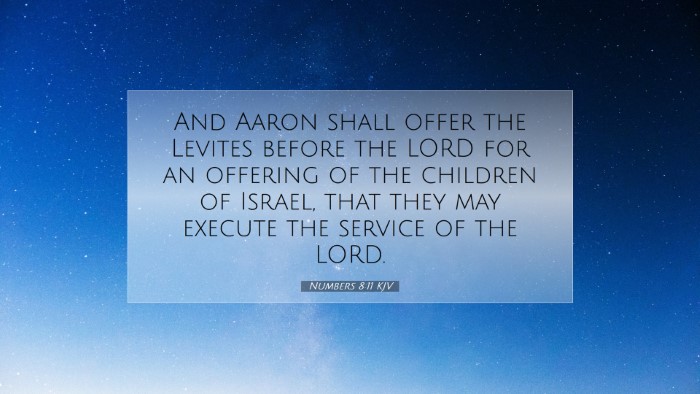Commentary on Numbers 8:11
Bible Verse: Numbers 8:11 - "And Aaron shall offer the Levites before the LORD, as an offering of the children of Israel, that they may execute the service of the LORD."
Introduction
This verse occurs in a pivotal section of the Book of Numbers, which focuses on the organization of the Israelite community in the wilderness, especially concerning the roles of the Levites. The Levites, set apart for the service of God, hold a unique position among the tribes of Israel, and this verse captures the essence of their consecration and service.
The Role of Aaron and the Levites
Matthew Henry's Commentary: Henry emphasizes the significance of Aaron's function in this ceremonial act. As the high priest, Aaron plays a crucial role in presenting the Levites before the LORD as a wave offering. This act symbolizes not just their consecration but also their commitment to God's service. Henry notes that this public ceremony underscores the communal responsibility of the Israelites, representing their collective dedication to God through the Levitical priesthood.
Albert Barnes' Notes: Barnes highlights that the offering of the Levites serves as a literal representation of the firstborn of Israel, which God claims for Himself. The Levites were chosen to replace the firstborns of Israel, who were originally set apart for divine service. Thus, this act of offering symbolizes the fulfillment of a substitutionary role, illustrating profound themes of redemption and the necessity of atonement in spiritual service.
Consecration and Symbolism
Adam Clarke's Commentary: Clarke delves into the ceremonial aspects of the offering. He explains that the act of presenting the Levites was not only a legalistic requirement but also rich with spiritual symbolism. The Levites’ offering before the LORD signified their personal dedication and willingness to serve God. This symbolic act represents the deeper theological truth that service to God must come from a willing heart, and it reflects the believer's call to consecrate oneself fully to the service of God.
The Importance of Service: Each commentary provides a perspective on the Levitical service as essential to both the spiritual life of Israel and the divine order established by God. The Levites were tasked with the care of the tabernacle, and their dedication to this service was foundational for the worship life of the nation. This calls to mind the New Testament themes of service within the body of Christ, as believers are also called to present themselves as living sacrifices (Romans 12:1).
Theological Implications
This verse provides several theological insights for pastors, students, and scholars:
- Divine Election: The choosing of the Levites signifies God's sovereign choice and purpose. The replacement of the firstborn illustrates a theme of substitution and redemption, which resonates through both the Old and New Testaments.
- Service as Worship: The act of service is intrinsically tied to worship. Just as the Levites were consecrated for service, believers today are called to engage in acts of service as an expression of their worship and devotion to God.
- Community Responsibility: The communal aspect illustrated here highlights the collective nature of faith. The act of Aaron offering the Levites is a reminder that each member of the community shares a responsibility in the life of faith and worship.
Practical Applications
For modern believers, Numbers 8:11 encourages several practical applications:
- Personal Consecration: Individuals are encouraged to examine their own lives and consider their personal commitment to God's service. How might they offer themselves in service to God's purposes?
- Valuing Service: The verse speaks to the need to appreciate and uphold those in positions of service within the church, recognizing their role as vital to the spiritual well-being of the community.
- Understanding God's Calling: Believers should seek to understand their unique calling and how they contribute to the broader mission of the church.
Conclusion
Numbers 8:11 is a rich and multi-dimensional verse that highlights key themes of calling, service, and community responsibility. Through the insights gathered from the public domain commentaries of Matthew Henry, Albert Barnes, and Adam Clarke, we find the enduring truths of God's covenant-based relationship with His people. The principles embedded in this verse encourage both theological reflection and practical application, reminding all who serve in various capacities within the church of their vital role in the ongoing narrative of God's work among His people.


